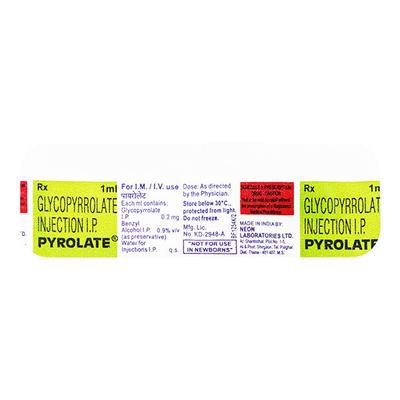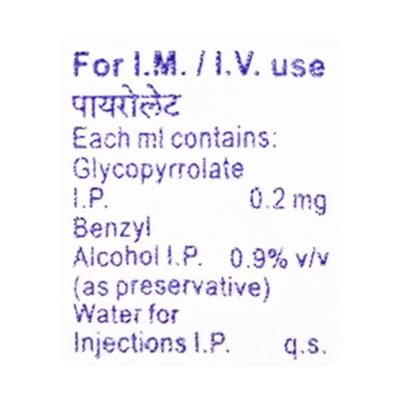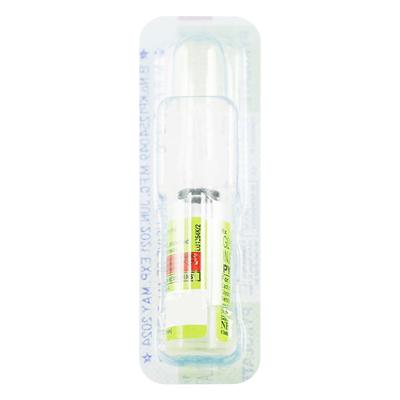

Netmeds First Membership
Quick Links
Introduction About PYROLATE INJECTION
PYROLATE INJECTION contains Glycopyrrolate which belongs to the group of medicines called Anticholinergics. It is used before or during an operation to reduce saliva and other secretions and to reduce or manage the slowness of the heartbeat during surgery.
PYROLATE INJECTION is also used to protect from the unwanted effects of certain drugs used to reverse the effects of muscle relaxing drugs such as neostigmine or pyridostigmine.
PYROLATE INJECTION is not recommended for use in patients having heart diseases, glaucoma (increased pressure in the eye), myasthenia gravis, enlarged prostate, stomach or bowel problems (pyloric stenosis or paralytic ileus) or if you are taking a specific medicine called neostigmine.
PYROLATE INJECTION should be used with caution in patients who have kidney diseases, down’s syndrome, gastric reflux, diarrhea, ulcerative colitis, overactive thyroid gland, or high temperature. PYROLATE INJECTION should be used with caution among pregnant and breastfeeding women. Caution must be exercised while using PYROLATE INJECTION in children and elderly patients above 60 years of age.
The most common side effects of receiving PYROLATE INJECTION are dry mouth, drowsiness, visual disturbances, fast irregular heartbeats, and an urge to pass urine but the inability to do so. Contact your physician for advice if any of the symptoms worsen.
Uses Of PYROLATE INJECTION
- it is used before an operation to decrease the saliva and other secretions and to reduce acidity in the stomach contents
- it is used before or during an operation, to decrease or manage slowness of the heartbeat during surgery
- it is used to protect from the unwanted effects of certain drugs used to reverse the effects of muscle relaxing drugs such as neostigmine or pyridostigmine
How PYROLATE INJECTION Works
PYROLATE INJECTION helps in decreasing the secretions of the body by blocking the activity of acetylcholine (a chemical messenger in the body responsible for acid and saliva production). Thus, decreasing the production of saliva and stomach acid.
How to use PYROLATE INJECTION
PYROLATE INJECTION will be given to you only by a physician or a nurse into a vein as an intravenous infusion or into a muscle (intramuscular). The correct dose and duration will be decided by your physician for you depending on your age, body weight, and disease condition.
Side Effects Of PYROLATE INJECTION
Common
- dry mouth
- drowsiness
- visual disturbances
- changes in heart rate (fast/irregular heartbeats)
- an urge to pass urine but the failure to do so
How To Manage Side Effects
Dizziness Or Drowsiness
Take adequate sleep. Do not involve in rigorous activities. Do not interfere with your sleep cycle. Talk to your doctor if the drowsiness doesn’t improve.
Dry Mouth
Dry mouth can be managed by chewing sugar-free gum or sucking on sugar-free hard candies to stimulate the flow of saliva. Sip water at regular intervals of time. Do not use mouthwashes that contain alcohol because they can be drying. Consult your physician for advice.
Warning & Precautions
Pregnancy
Use with CautionPYROLATE INJECTION should be used with caution in pregnant women or are planning to have a baby. Consult with your doctor for advice.
Breastfeeding
Use with CautionPYROLATE INJECTION should be used with caution in breast feeding women. Consult with your doctor for advice.
Driving and Using Machines
Use with CautionDo not drive or use machines if you feel there is blurring of vision after receiving PYROLATE INJECTION.
Kidney
Consult your doctorPYROLATE INJECTION should be used with caution in patients having kidney diseases. Your doctor may adjust your dose depending on your health condition. Consult with your doctor before receiving PYROLATE INJECTION.
Allergy
ContraindicatedDo not receive PYROLATE INJECTION if you are allergic to Glycopyrrolate or to any of the other ingredients of this medicine.
Heart Disease
Use with CautionPYROLATE INJECTION is not recommended for use in patients having heart diseases such as QT prolongation (seen on ECG) characterized by irregular heartbeats. PYROLATE INJECTION should be used with caution in patients having history of heart diseases, heart attack, coronary heart disease, and rapid heartbeat. Consult with your doctor before receiving PYROLATE INJECTION.
Use In Pediatrics
Consult your doctorPYROLATE INJECTION should be used with caution in children. Your doctor will decide the correct dose and duration of PYROLATE INJECTION for your child depending on your child’s age, weight and health condition. Consult with your child’s doctor.
Use In Geriatrics
Consult your doctorPYROLATE INJECTION should be used with caution in elderly patients above the age of 60 years. Your doctor will decide the correct dose and duration of PYROLATE INJECTION for you depending on your child’s age, weight and health condition. Consult with your doctor before receiving PYROLATE INJECTION.
Others
PYROLATE INJECTION is not recommended for use if you have:
- glaucoma (increased pressure in the eye)
- myasthenia gravis (muscle weakness and fatigue)
- prostatic hypertrophy (enlarged prostate gland)
- stomach or bowel problems such as abdominal pain and swelling (paralytic ileus), obstruction of the stomach (pyloric stenosis) or bowel causing vomiting
Before receiving PYROLATE INJECTION, inform your physician if you have:
- gastric reflux (liquid stomach contents backing up in the food pipe)
- diarrhea
- down’s syndrome
- ulcerative colitis (inflammation of the large intestine)
- a high temperature (fever)
- hyperthyroidism (overactive thyroid gland)
- have been given inhalational anesthesia
Interactions
A. Drug-Drug interactions:
Before receiving PYROLATE INJECTION, inform your physician if you are taking any of the following medicine:
- medicine used to manage depression (tricyclic antidepressants or monoamine oxidase inhibitor (MAOIs) antidepressants (Ex. amitriptyline, imipramine, phenelzine, or tranylcypromine)
- medicine used to manage severe mental disorders (Ex. clozapine)
- medicine used to manage severe pain (Ex. nefopam)
- medicine used to manage Parkinson’s disease or viral infection (Ex. amantadine, levodopa)
- medicine used to manage severe mental problems or nausea, vomiting, or vertigo (Ex. phenothiazines like chlorpromazine, fluphenazine, prochlorperazine, trifluoperazine)
- medicine used to manage allergies (antihistamines) (Ex. promethazine)
- medicine used to manage moderate to severe pain (Ex. pethidine)
- medicine used to manage nausea and vomiting (Ex. domperidone or metoclopramide)
- medicine used to manage fungal infections (Ex. ketoconazole)
- medicine used to manage Alzheimer’s disease (Ex. memantine)
- medicines that affect chemicals in the body which are involved in the transmission of nerve impulses to a muscle (parasympathomimetic) (Ex. carbachol, neostigmine, physostigmine)
- medicine used to manage uncomplicated premature labor (Ex. ritodrine)
- medicine used to manage various conditions including asthma and inflammatory disease (corticosteroids) (Ex. prednisolone)
- medicine used to manage heart problems (Ex. slow-dissolving digoxin tablets, and disopyramide)
- medicine used to manage angina (Ex. Glyceryl trinitrate tablets)
Overdosage:
PYROLATE INJECTION will be administered to you only by a physician or a nurse in a hospital, and so it is unlikely to receive an overdose. However, consult your physician or nurse if you experience any unusual symptoms. The symptoms of overdosage are hypotension, respiratory failure, a curare-like action (neuromuscular blockade leading to muscular weakness), and possibly paralysis.
Synopsis
| Drug | : | Glycopyrrolate |
| Pharmacological Category | : | Anticholinergics |
| Therapeutic Indication | : |
Reduce saliva and other secretions, reduce acidity in stomach, reduce or manage slowness of heartbeat, protect from unwanted side effects of neostigmine and pyridostigmine |
| Dosage Forms | : | Tablet, Injection, Respules, Transpule |
More Information
- Keep PYROLATE INJECTION out of reach of children
- Store PYROLATE INJECTION at a temperature, not more than 25°C
FAQs About PYROLATE INJECTION
Q: What is PYROLATE INJECTION and why is it given?
A: PYROLATE INJECTION contains Glycopyrrolate which belongs to the group of medicines called Anticholinergics. It is used before or during an operation to reduce saliva and other secretions and to reduce or manage the slowness of the heartbeat during surgery. PYROLATE INJECTION is also used to protect from the unwanted effects of certain drugs used to reverse the effects of muscle relaxing drugs such as neostigmine or pyridostigmine.
Q: Does PYROLATE INJECTION affects my ability to drive?
A: PYROLATE INJECTION may cause your eyesight to become blurred which could interfere with your ability to drive or operate machinery safely. You should not drive or use machines after being given PYROLATE INJECTION until the doctor advises you that you are safe to do so.
Q: How is PYROLATE INJECTION given?
A: PYROLATE INJECTION will be given to you only by a physician or a nurse into a vein as an intravenous infusion or into a muscle (intramuscular). The correct dose and duration will be decided by your physician for you depending on your age, body weight, and disease condition.
Q: Can PYROLATE INJECTION cause dry mouth?
A: Yes. PYROLATE INJECTION may cause dry mouth. Dry mouth can be managed by chewing sugar-free gum or sucking on sugar-free hard candies to stimulate the flow of saliva. Sip water at regular intervals of time. Do not use mouthwashes that contain alcohol because they can be drying. Consult your physician for advice.
Q: Is it safe to use PYROLATE INJECTION in patients with heart problems?
A: PYROLATE INJECTION is not recommended for use in patients having heart diseases such as QT prolongation (seen on ECG) characterized by irregular heartbeats. PYROLATE INJECTION should be used with caution in patients having history of heart diseases, heart attack, coronary heart disease, and rapid heartbeat. Consult with your doctor before receiving PYROLATE INJECTION.
References
1. Holly E. Gurgle and Donald K. Blumenthal. Drug Therapy for Dyslipidemias. Goodman & Gilman’s The Pharmacological basics of Therapeutics. 13th Edition. New York McGraw Hill Medical 2018. Page – 605-618.
2. Science Direct. Glycopyrronium Bromide. [Accessed on 6th July 2022] https://www.sciencedirect.com/topics/medicine-and-dentistry/glycopyrronium-bromide
3. Hwang, J., Min, S., Kim, C. et al. Prophylactic glycopyrrolate reduces hypotensive responses in elderly patients during spinal anesthesia: a randomized controlled trial. Springer Link. December 2013. [Accessed on 6th July 2022] https://link.springer.com/article/10.1007/s12630-013-0064-y#citeas
4. Accord Healthcare Limited. Electronic Medicines Compendium (EMC). [Revised in October 2019] [Accessed on 6th July 2022] https://www.medicines.org.uk/emc/files/pil.3523.pdf
5. Pharmacy Retailing (NZ) Limited. Medsafe. [Revised in February 2019] [Accessed on 6th July 2022] https://www.medsafe.govt.nz/Profs/Datasheet/r/Robinulinj.pdf
6. B. Braun Melsungen AG. Electronic Medicines Compendium (EMC). [Revised in April 2022]. [Accessed on 6th July 2022] https://www.medicines.org.uk/emc/files/pil.2786.pdf









